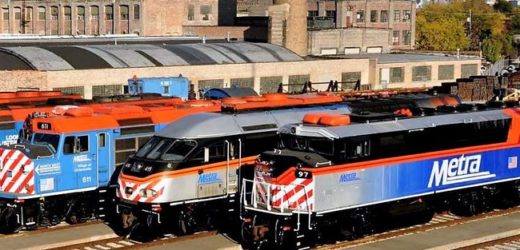4
Test of Reverse Commute Comes as More Workers Move to the City
Reported by Jennifer Waters, Chicago Reporter CoStar Group
The Chicago area’s commuter rail system, in a potential boost to the suburban office market around the third-biggest U.S. city, plans to test extra stops on its northbound line to try to improve the reverse commute from downtown — where many millennials live — to businesses in far North Shore communities.
Metra commuter rail and Lake County Partners, a nonprofit civic and business group, are in the final stages of forming a public/private partnership to add temporary stops to the Metra Milwaukee District North Line train. The pilot program, which hinges on Metra board approval next week, would provide more options for workers as far north as Fox Lake traveling to downtown Chicago, a 54-mile trek by car.
If successful, the test could prompt a change to include a crossover rail to make it a lasting part of the Metra schedule, a project that is estimated to cost about $4.75 million. That could help suburban office demand as companies try to attract and retain young workers. Corporations are relocating all or part of their operations from the suburbs to city office space to lure workers living around downtown, including restaurant chain McDonald’s, food producer Kraft Heinz, tech provider Motorola Solutions and beverage maker Beam Suntory.
The stakes are particularly high in Chicago, which is among the top cities where commuters will switch jobs to improve their commute. “This is an important project,” said Kevin Considine, chief executive of Lake County Partners, which initiated the partnership. “If this new schedule is approved, it will be easy to live downtown and work in Lake County.”
Commute times are a pressing matter for many U.S. employees, and it seems millennial-aged ones in particular, according to a recent study by Robert Half, the specialized staffing firm.
“Commutes can have a major impact on morale and, ultimately, an employee’s decision to stay with or leave a job,” said Paul McDonald, senior executive director for Robert Half.
Overall, 23 percent of those polled said they switched jobs because of a long commute time, and Chicago took the top spot where that happens, behind Miami, New York and San Francisco, though Robert Half did not post the percentage differences.
At 34 percent, those who are from 18-34 years old were the biggest demographic to leave a job because of the home-to-office slog, behind workers age 35-45 at 25 percent and 55 and older at 12 percent.
Some of that, of course, might be based on what lifetime stages people are in during those years, but it does point to what many corporations have dealt with as they attempt to attract talent to outer suburban locations.
“In today’s candidate-driven market, skilled workers can have multiple offers on the table,” McDonald said. “Professionals may not need to put up with a lengthy or stressful trip to the office if there are better options available.”
The Chicago commuter rail project could also help increase ridership on the Metra trains that serve as a major commuter conduit from all of the city’s surrounding suburbs amid fewer passengers as many workers have taken up residence in the city.
If the Metra board approves the proposal — nearly six months in the making — the Metra and Lake County partnership would launch a two-year project to determine if a permanent route change could be made. The pilot is expected to cost a total of $1.4 million, or $700,000 annually that will be split evenly between the partnership, which would pay its part through funds provided by participating municipalities.
“There are gaps in our current schedule that would make it difficult for someone to reverse commute,” said Michael Gillis, communications director for Metra. “We’re proposing a schedule that addresses some of that within the existing infrastructure.”
Metra approval would put a schedule change in play to add an outbound train from Chicago’s Union Station at 5:35 a.m. arriving in the Lake Forest station at 6:25 a.m. It would not be a full express train, but would only stop at the Lake-Cook Road, Deerfield and Lake Forest stations, Gillis said.
An extra evening train would depart Lake Forest at 5:30 pm, with stops at the Deerfield and Lake-Cook stations but no others until the Edgebrook station in the city at 5:52 pm, arriving in Union Station at 6:22 pm.
Metra also is looking at changing an existing early evening schedule so that it’s a faster trip, originating in Fox Lake and hitting Lake Forest at 5:09 pm with a stop in Deerfield and at Lake-Cook and then straight to Western Avenue, the last stop before Union Station.
Metra also would have to make other changes to accommodate the program, but both parties are hopeful, Gillis said. If the pilot is successful, Metra and Lake County Partners would “co-fund the construction of a crossover near Lake Forest that would make it easier to further enhance the reverse commute service to the area,” he said. “But we’re testing it first.”

